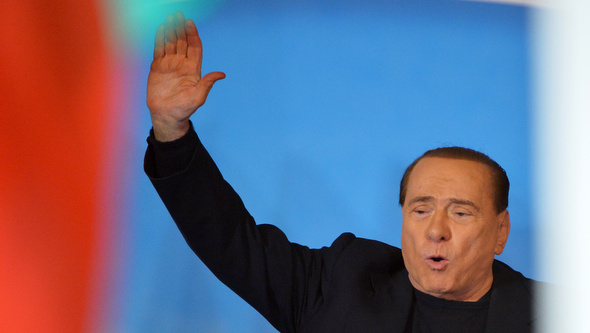
Silvio Berlusconi
IT WAS Italian politics at its most extravagantly theatrical. Inside the Senate on November 27th as it prepared to vote on Silvio Berlusconi’s expulsion, some of his party’s female lawmakers appeared dressed in widow’s black. Outside, the former prime minister told a noisy (but notably modest) rally of his supporters that it was a “day of mourning for democracy”.
Ignoring the histrionics, a majority in the upper house defeated a string of motions intended to block Mr Berlusconi’s removal following his conviction in August for tax fraud. As a result, Italy’s longest-serving prime minister since the second world war, a man who has dominated the public life of his country for more than 20 years, no longer has parliamentary immunity. One of Mr Berlusconi’s many lawyers, Franco Coppi, said the idea his client might go to jail was “unreal”. Unlikely, perhaps. But no longer impossible.
The day before the vote, Mr Berlusconi’s party—newly relaunched under its old name of Forza Italia! (“Come on Italy”) —abandoned Enrico Letta’s coalition government and voted against the 2014 budget (though without blocking it). Italy now has a left-right opposition to go with its left-right government: the opposition already included the radical Left, Ecology and Freedom (SEL) party, the Northern League and the Five Star Movement (M5S), led by an ex-comedian, Beppe Grillo, who claims it is neither left nor right.
Before his expulsion, Mr Berlusconi did all he could to avoid it. He urged President Giorgio Napolitano to grant him a pardon; beseeched the senators of the left and M5S to rethink their support for his removal so they would not one day feel “ashamed in front of [their] children”; warned that the demonstration on the day of the vote would be “just the beginning” and demanded a re-trial, claiming to have vital new evidence and seven new witnesses (his lawyers said later there were even more).
Why such desperation? Mr Berlusconi himself acknowledged that the Senate could remove him from parliament, but not from politics. Mr Grillo has shown the way: he too was convicted of a criminal offence (manslaughter arising from a road accident) and is not a member of the legislature. Yet he still exerts a decisive influence on the M5S from outside.
The former prime minister’s efforts to remain in parliament suggest that, unlike his lawyer, he feels the threat of jail is anything but unreal. Though given a four-year sentence for the tax fraud, he did not go to prison for various reasons. He benefited from a pardon that wiped three years off sentences for offences committed before 2006. He is a first-time offender. And he is over the age of 70. But neither of the first two factors will apply if he is convicted again. Mr Berlusconi is appealing against a seven-year sentence for paying an underage prostitute and then taking advantage of his position as prime minister at the time to cover up their relationship. He is due to go on trial again next year charged with bribing a senator to change sides in parliament.
An even greater threat for Mr Berlusconi is that he is under investigation for suspected perversion of the course of justice and could soon be made a suspect in another inquiry. In Italy, the risk of being flung in jail while under investigation or awaiting trial is considerable: according to the latest comparable figures, the proportion of prisoners on remand was the highest in Europe after Turkey and some micro-states. The Berlusconi story, which has bewitched Italians for more than 20 years, is far from over.
(Photo credit: AFP)